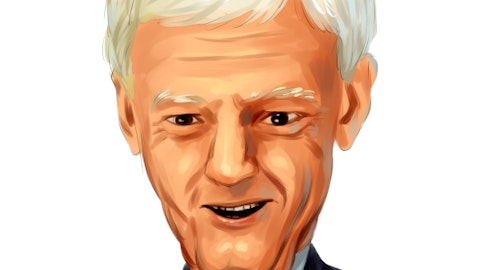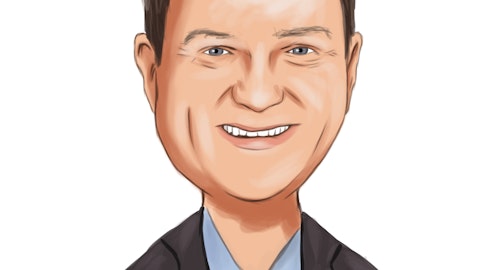Thomas Brisbin: I can’t see it because they’re highly driven by 2030 and 2050 decarbonization goals. They’re actually looking for more help in my opinion to — try to figure out how to get there with their financial crunch. So we are not seeing any decline in their interest or just seeing more motivation on how they get there. And that requires actually like our E3 Group a lot smarter people because they know what’s coming in the future, they help these companies see it, and then they dig through all the possibilities, whether it be the IRA money, incentive money in the utilities. So I don’t see it shrinking that problem because we all have goals to meet. Mike, do you have anything to add to that?
Michael Bieber: No. And it partially explains why our results are getting stronger and stronger as interest rates have gone up 5%. There’s no correlation. The projects are dropping off or getting more difficult, we’re actually accelerating right now.
Craig Irwin: Excellent. That actually — that answers what I was going to put up as my next question a little bit, but maybe I’ll ask in a slightly different way. So typically during periods of economic weakness, you mentioned the financial crunch, Tom. The CFOs of different institutions take a look and say, where can I save money? Now Willdan’s energy efficiency business exists because it delivers verifiable savings to the customers. So can you maybe talk about the tempo of activity away even from some of these IRA or renewables related projects? Are you seeing sort of the countercyclical impact of sort of economic weakness, interest rate — higher interest rates and these other factors in the environment driving an elevated tempo of activity across your customer base?
Thomas Brisbin: Well, we’ve said before, we’re doing zero to very few IRA type projects that might pick up in the future. How that slows down? We don’t know. We see money coming through the green banks for financing. I think this whole strategy that we’ve talked about here was preparing for this day given our 2007/2008 experience, most of every part of what we do in Willdan now. We went right through the recession 2007, 2008 and 2009 without a hit. And we haven’t seen one yet. We have a little bit of coal mine here with the engineering business. As I told you, they’re up 11%, 12%, 13%. There’s a couple of explanations that we have hypothesized what’s going on in this economy. One, it’s harder to get people. So these municipalities versus 2007/2008 are using our people outsourcing it.
We always dreamt about the day that we figure out outsourcing is cheaper than hiring. And maybe with the way the retirement structures are in municipalities, they finally figured out they can’t afford to pay for one physician two or three people, the retirement. So we see — we’re not seeing what we thought we would see in municipalities. It’s actually increasing when we think it should be decreasing. So I think we’re bucking the trend the right way. As Mike said, the numbers show we are. And I don’t know if I completely got this question, Mike. Have you got anything to add to that?
Michael Bieber: We don’t know whether higher interest rates are accelerating our business or not yet. I don’t think we have enough data that was exactly what your question was, I think, Craig, but we are accelerating and there are higher interest rates. How about that?
Thomas Brisbin: When can higher interest rates ever help anyone?
Michael Bieber: Yeah.
Craig Irwin: Yeah. No.
Michael Bieber: Saving energy.
Thomas Brisbin: Saving energy would be, yeah. But higher interest rates are never any good for anyone.



